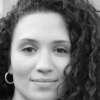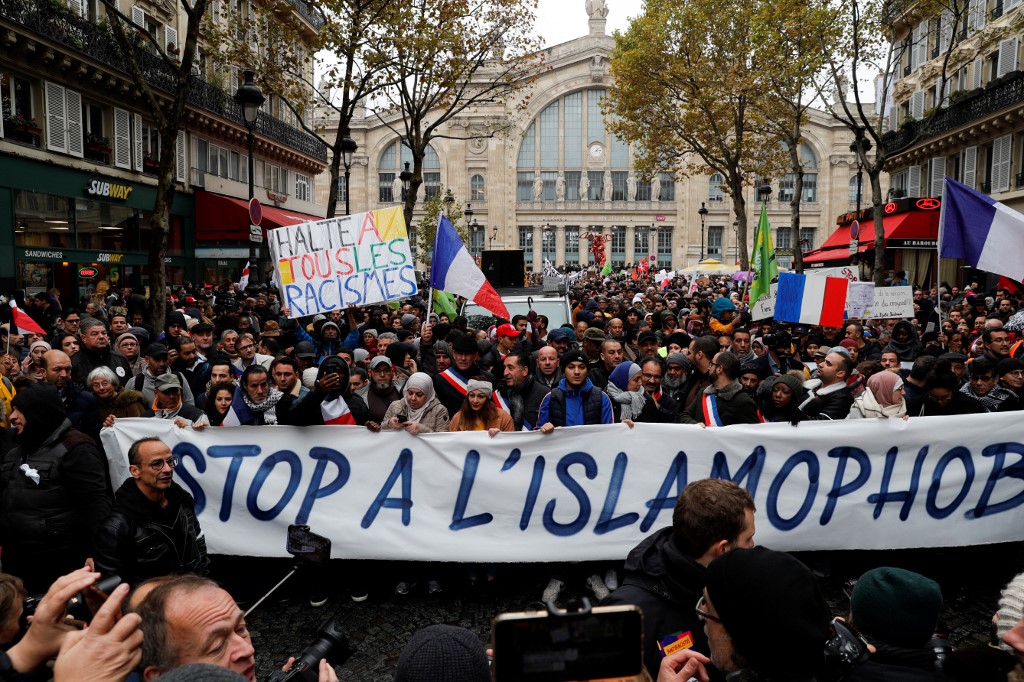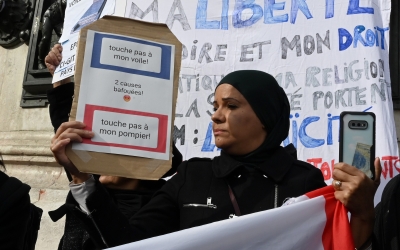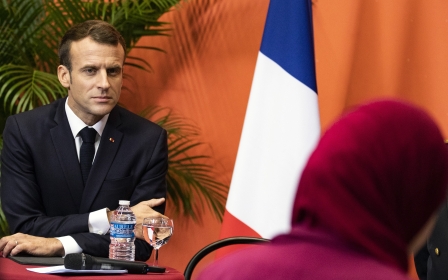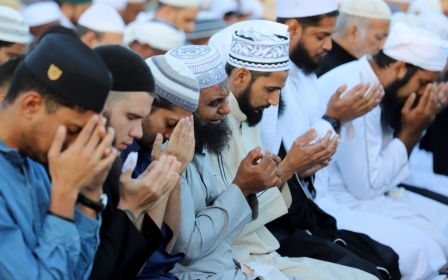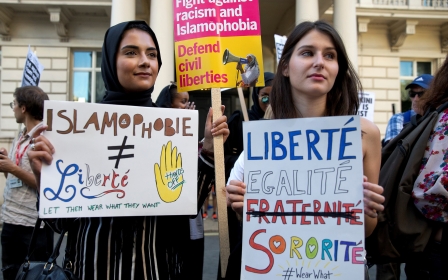Will a united front against the far-right transform French politics?
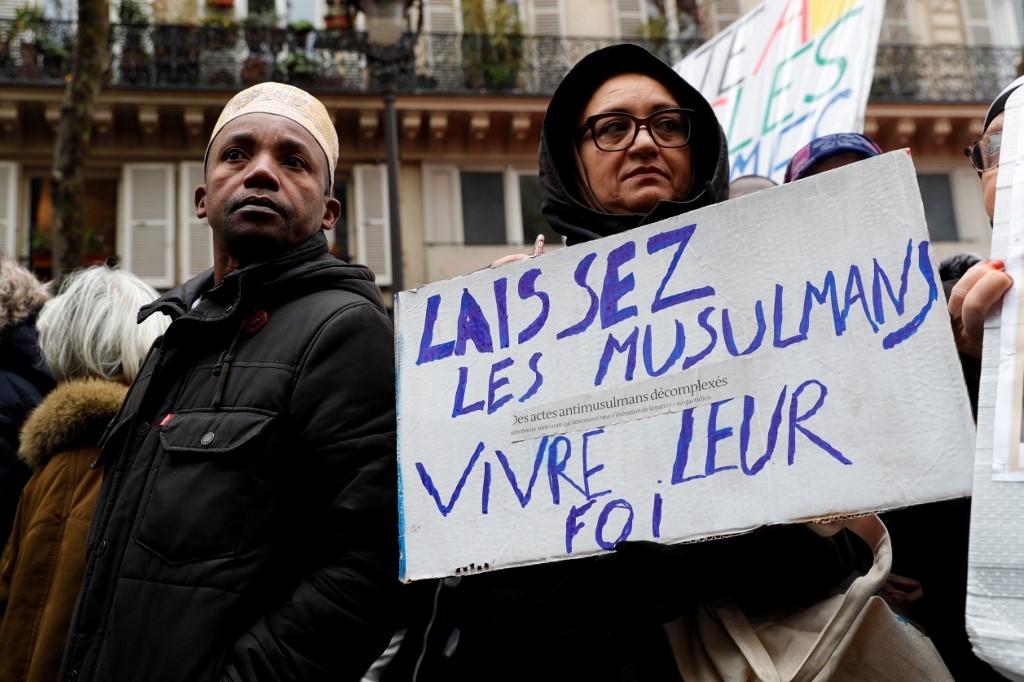
Thousands marched across France recently - mainly in Paris, but also across other cities, including Toulouse and Marseille - against Islamophobia.
This followed an attack a few days earlier on a mosque in Bayonne by a man who allegedly attempted to set fire to the building. The alleged attacker - who was reportedly a former candidate of the fascist National Front - opened fire on two elderly men who attempted to stop him.
The attack came on the back of days of public “debate” on the hijab, the place of Muslims in French society, and an effective ban on women wearing a hijab from accompanying their children on school outings.
Growing racism and fascism
While outrage from Muslims and communities of colour over growing racism and fascism in France is nothing new, the mobilisations and attention that the latest demonstrations received were important.
New MEE newsletter: Jerusalem Dispatch
Sign up to get the latest insights and analysis on Israel-Palestine, alongside Turkey Unpacked and other MEE newsletters
For too long, it has felt as though the impact of violent, state-sanctioned repression by police, the normalisation of Islamophobia by politicians, journalists and commentators, including the passing of Islamophobic laws, and the unwillingness of mainstream left-wing parties and groups in France to extend a modicum of solidarity towards Muslims, left little hope for countrywide action against Islamophobia.
Despite dominant Islamophobia even on the left, growing sections of progressives in France are actively challenging it
Yet protesters have ranged well beyond the Muslim community - from elderly women, to students and trade unionists - all taking a stand against attacks on visibly Muslim women, institutional racism against Muslim schoolchildren, and the politics of hate, reinforced by French President Emmanuel Macron’s government.
France has not been a stranger to mass action in recent months. Over the past year, since the eruption of the Yellow Vest movement - first over rising fuel costs, then in demand of radical political change - the country has witnessed sustained protests against those in power.
Mass strikes have also punctuated Macron’s presidency, with railway workers bringing the country to a standstill.
Days after the anti-Islamophobia demonstrations, students flooded the streets to take a stand against rising poverty, after a 22-year-old set himself on fire over this issue. The incident took place in Lyon, but outrage spread across the country as the message of #laprecaritetue (insecurity kills) became a common rallying cry.
The power of the people
It is easy to see such movements as separate political projects, but to do so ignores the diverse involvement of large sections of French society in efforts to take down the French government and to rethink the power of the people. New alliances are being built in the process.
Within weeks of the Yellow Vest protests launching, anti-racist groups organised collectively to ensure a zero-tolerance approach to fascism, to counter far-right attempts to co-opt the movement.
Groups such as Comite Adama - which has organised against police and state violence since the death of Adama Traore, a 24-year-old black man killed after contact with police in Beaumont-sur-Oise - called on people of colour to take a stand by joining the Yellow Vests.
In the past, it felt as though mainstream left-wing spaces in France - from major trade unions to the student movement - were nowhere to be seen on discussions on racism, and certainly not on Islamophobia in particular.
It felt as though this was a country where you either fought against racial oppression, or against a neoliberal agenda, but that the two projects were incompatible.
The latter movement was seen to have failed to engage with, and to root out, racism, while those engaged in the former were often sidelined as being unwilling or “too conservative” to have anything to do with opposing capitalism.
Yet these divisions are more often artificial intellectual categories than accurate representations of reality. Indeed, the majority of Muslims in France are among the poorest sections of the working class, and are therefore engaged in social movements, trade unions and strikes.
Similarly, despite dominant Islamophobia even on the left, growing sections of progressives in France are actively challenging it. From the New Anticapitalist Party to the leadership of the rail workers, the political and trade-union left has mobilised and joined with Muslims in struggle.
Is the tide turning?
Even Jean-Luc Melenchon, leader of the left-wing France Insoumise party, who has in the past failed to challenge attacks on Muslim women by the state, not only attended the demonstration against Islamophobia, but then defended his presence by challenging those who attacked him over it.
When journalists claimed he was normalising the presence of “Islamists” on the march, Melenchon reminded them that they had not shown such concern as he marched against the antisemitic murder of Holocaust survivor Mireille Knoll, despite the heavy presence of the far-right and Marine Le Pen at the same demonstration.
So, is the tide now turning? Especially in the heat of international uprisings, which the people of the Global South are leading, it certainly feels as though new possibilities are emerging in the republic.
It is striking that the largest visible stand against Islamophobia took place during a time of year-long pressure against growing poverty, unemployment and rising living costs.
On 5 December, a mass strike and demonstration brought France to a standstill. In a country known for the events of May 1968, when students and workers brought an entire government to its knees, this mobilisation has the potential to make a lasting impact and to change the course of France’s political drift to the far-right.
The outcome of these mobilisations is uncertain. But one thing is clear: taking down Macron’s government and radically transforming the French political system is far more likely to happen collectively, alongside migrants, people of colour and Muslims. If questions of race are omitted, whatever comes next will be incomplete.
The old slogan of 1968 sums it up perfectly: L’emancipation de l’homme sera totale ou ne sera pas (The liberation of humanity will be total or it will not be).
The views expressed in this article belong to the author and do not necessarily reflect the editorial policy of Middle East Eye.
Middle East Eye delivers independent and unrivalled coverage and analysis of the Middle East, North Africa and beyond. To learn more about republishing this content and the associated fees, please fill out this form. More about MEE can be found here.


